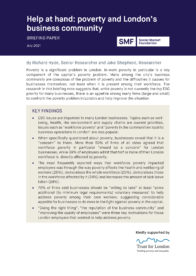In-work poverty is a key part of London's poverty problem. Many among the city’s business community are conscious of this and the difficulties poverty presents for employers, their workers, communities and supply chains. This research shows that whilst it is not currently the top ESG priority for many businesses, there is an appetite among many firms to confront the poverty problem in London.
Key findings
- ESG issues are important to many London businesses. Topics such as well-being, health, the environment and supply chains are current priorities. Issues such as “workforce poverty” and “poverty in the communities local to business operations in London” are less popular.
- When specifically questioned about poverty, businesses reveal that it is a “concern” to them. More than 50% of firms of all sizes agreed that workforce poverty in particular “should be a concern” for London businesses, while 39% of employers admit that half or more of their London workforce is directly affected by poverty.
- The most frequently reported ways that workforce poverty impacted employers was through the way poverty effects the health and wellbeing of workers (26%), demoralises the whole workforce (25%), demoralises those in the workforce affected by it (24%) and increases the amount of sick leave taken (24%).
- 70% of firms said businesses should be “willing to take” at least “some additional (to minimum legal requirements) voluntary measures” to help address poverty among their own workers, suggesting considerable appetite for businesses to do more in the fight against poverty in the capital.
The next stage of this project, supported by Trust for London, will see more extensive engagement with the London business and investor communities and the publication of more research into business attitudes towards and experiences with standards and benchmarks. We welcome the ideas and observations of businesses, relevant civil society groups, academics, practitioners and others on this research, the wider project and its objectives, and encourage those who are interested in this issue to contact the Social Market Foundation via director@smf.co.uk to be part of this conversation. See here for further details.


